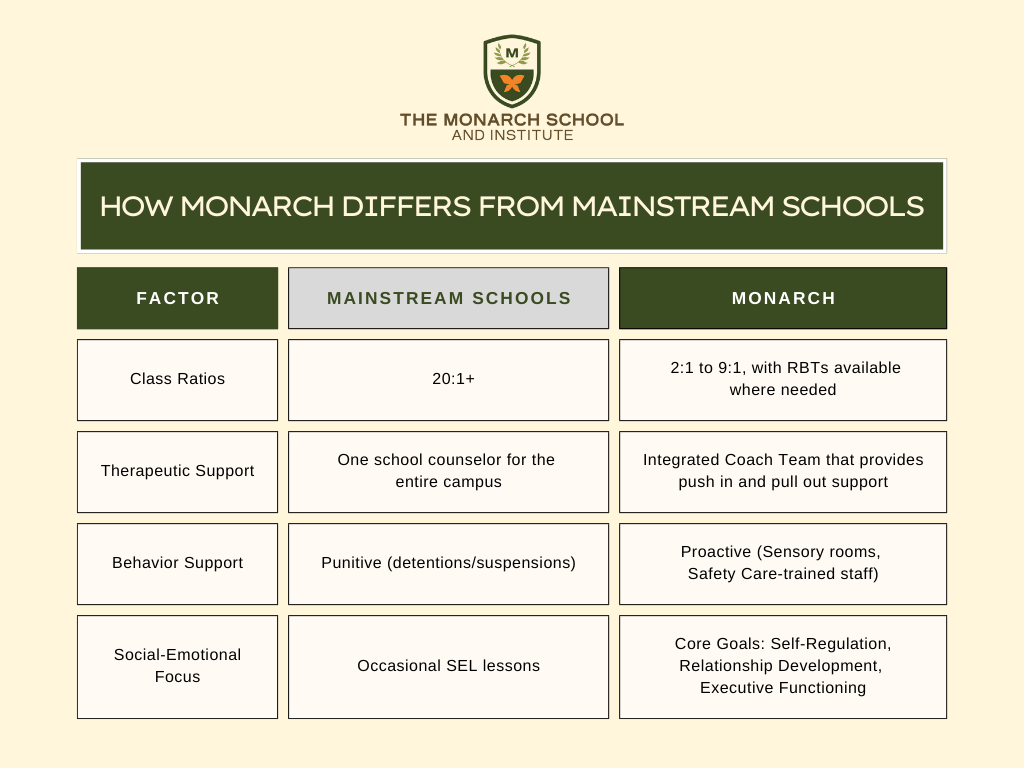When to Consider a Therapeutic School: Signs Your Child Needs More Support
By Dr. Shannon McKee, Director of Clinical Services and Training at The Monarch School and Institute
As a parent, you want the best educational environment for your child—one where they feel understood, supported, and empowered to learn. But what if traditional school settings aren’t meeting their needs? For children with neurological differences—such as autism, ADHD, anxiety, or learning disorders—mainstream schools may lack the specialized resources to help them thrive.
If you’ve noticed persistent struggles despite interventions, it may be time to consider a therapeutic school like Monarch. Here’s how to recognize the signs and determine if a therapeutic environment is the right fit.
Red Flags: When Traditional School Isn’t Enough
Every child has challenging days, but consistent patterns of distress may indicate a need for more support. Watch for:
✔ Frequent Meltdowns or Shutdowns
Your child comes home emotionally exhausted, with outbursts or withdrawal.
Example: "After school, my son would scream for hours—until we learned his classroom was overstimulating."
✔ Avoidance Behaviors
Refusing school, faking illness, or hiding to escape demands.
Example: "My daughter hid in the bathroom daily to avoid reading aloud."
✔ Academic or Social Regression
Grades slipping despite effort or withdrawing from peers.
Example: "Our child stopped raising his hand after being mocked for stimming."
✔ Invisible Struggles
Anxiety, self-doubt, or low self-worth despite "looking fine."
Example: "Teachers said he was ‘lazy,’ but dysgraphia made writing torture."
✔ Feeling Unseen or Unappreciated
Your child’s strengths or efforts go unrecognized, while challenges dominate conversations.
Example: "Parent-teacher conferences only focused on what my son couldn’t do—no one mentioned his incredible memory or kindness."
✔ Overemphasis on Challenges
School feedback highlights deficits without celebrating progress or potential.
Example: "The IEP team kept saying, ‘He’ll never write an essay,’ but ignored his genius-level coding skills."
✔ Therapy Goals Stalling
Limited progress in private OT, speech, or counseling—likely because skills aren’t reinforced at school.
Example: At Monarch, a child with ADHD learns executive functioning skills during math class—not just in a weekly counseling session.
Checklist: Is a Therapeutic Environment Right for Your Child?
Ask yourself:
Does my child’s anxiety/behavior worsen during or after school?
Have teachers said, “We don’t have the resources to help”?
Would increased support, sensory breaks, or embedded therapies benefit them?
Do they need explicit instruction in social skills or emotional regulation?
If you checked 3+ boxes, a therapeutic school could unlock their potential.
Next Steps for Parents
Observe & Document
Track triggers (e.g., transitions, noise) and share notes with your child’s therapist.Explore Options
Monarch offers tours (2nd/4th Tuesdays) so you can see our model in action.Consult Professionals
Pediatricians and neuropsychologists can help assess fit.Trust Your Instincts
As one parent shared: “Switching to Monarch was the turning point. For the first time, my child said, ‘I love school.’”
You’re Not Alone
Many families wait too long to seek alternatives, fearing stigma or upheaval. But early intervention in the right environment can change trajectories. At Monarch, we’ve seen students flourish academically, socially, and emotionally—not despite their differences, but because their education is designed for them.
Ready to learn more? Schedule a tour or contact our admissions director at admissions@monarchschool.org
About the Author:
Shannon McKee has her PhD in school psychology and has been a Licensed Specialist in School Psychology (LSSP) and Nationally Certified School Psychologist for over 15 years. After working as an LSSP in public schools and serving on the autism assessment team, Shannon’s passion for learning and serving children and families affected by ASD led her to pursue her doctorate at the University of Houston.

